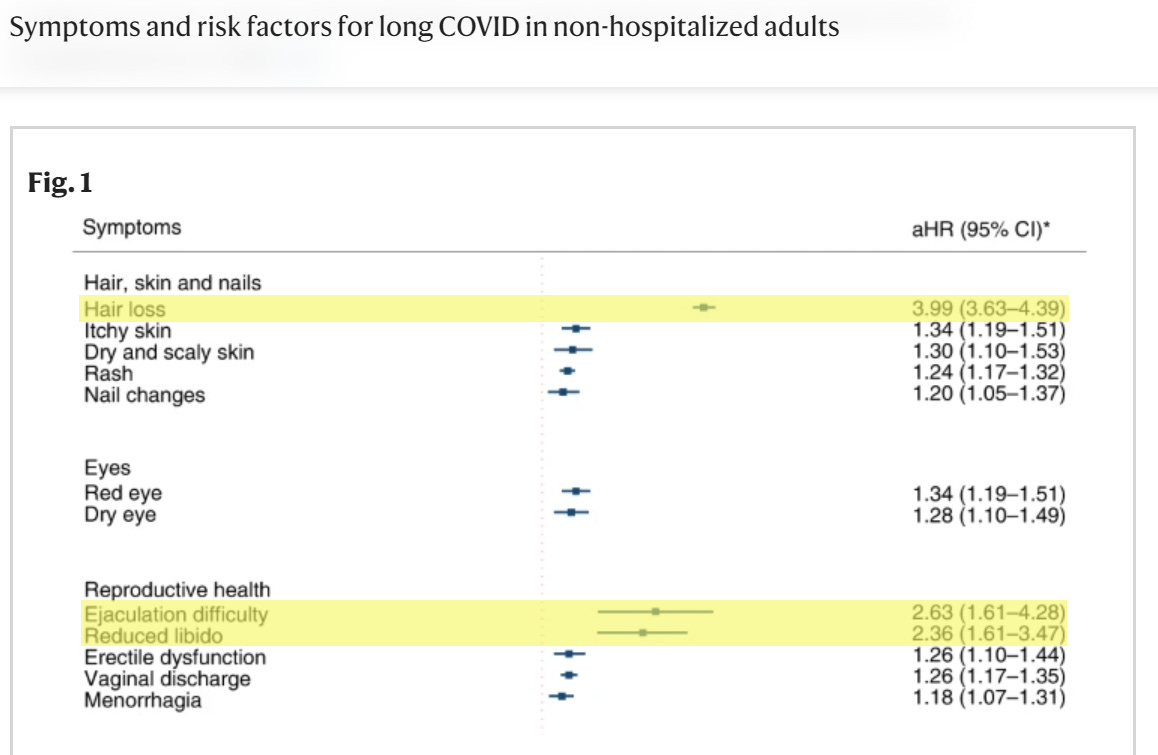NEW EVIDENCE SUGGESTING THE INVOLVEMENT OF ANTIPHOSPHOLIPID SYNDROME IN LONG COVID
The appearance of hair loss and sexual dysfunction as significant symptoms of Long COVID
A paper published in Nature on July 25th summarized the symptoms of Long COVID. What struck me is that, in addition to all the symptoms we are already extremely familiar with, two stood out as very common, and not previously discussed much.
These two are Hair Loss and Sexual Dysfunction.
What made me pursue this finding is that BOTH of these symptoms are directly involved in Antiphospholipid Syndrome.
Symptoms and risk factors for long COVID in non-hospitalized adults
https://www.nature.com/articles/s41591-022-01909-w
HAIR LOSS
In the journal Lupus, a paper published in 2003 showed that alopecia areata is a cutaneous sign of antiphospholipid antibodies.
Six of the nine patients had clinical evidence of associated autoimmune disorders (Graves’disease and autoimmune haemolysis in one, systemic scleroderma in one, Hashimoto’s thyroiditisin one, alopecia areata in one) and/or signs of hypercoagulability (recurrent fetal loss in two, recurrent strokes in one, recurrent deep vein thrombosis in one).
Primary anetoderma: a cutaneous sign of antiphospholipid antibodies
https://journals.sagepub.com/doi/10.1191/0961203303lu403oa
It is also recognized as a symptom of Secondary Antiphospholipid Syndrome.
Patients with secondary antiphospholipid syndrome may report symptoms of the underlying disease. For example, patients with underlying systemic lupus erythematosus may report features including a rash on the cheeks, skin reaction to sunlight, joint pains, mouth ulcers, excessive hair loss, dry eyes, cold and bluish fingers, and sometimes sharp chest pains.
The antiphospholipid syndrome (Hughes' syndrome)
https://www.netdoctor.co.uk/conditions/heart-and-blood/a1174/the-antiphospholipid-syndrome-hughes-syndrome/
SEXUAL DYSFUNCTION
Most interestingly, sexual dysfunction, including low intercourse satisfaction, occurs in patients with Antiphospholipid Syndrome.
In summary, male patients with APS may have erectile dysfunction and low intercourse Satisfaction. This sexual dysfunction is probably associated with arterial events and duration of the disease and may cause psychological problems with a consequent reduction of health-related quality of life.
Sexual Function and Dysfunction among Patients with Systemic and Auto-Immune Diseases
https://acmcasereport.com/wp-content/uploads/2021/02/ACMCR-v5-1493.pdf
I believe the prevalence of these symptoms and their association with Antiphospholipid Syndrome indicate an urgent and additional need to fully investigate the presence of Antiphospholipid Antibodies in those with Long COVID.



Related post of mine, https://transcendingsquare.com/2021/02/16/cannabinoids-blood-vessels-and-longcovid/ - I made the connection between cannbinoid deficiency and LongCovid fingers & hypoxia in 2020. The LNPs phospholipid content may be increasing the risk of autoimmune antibodies being formed against phospholipids.
The next post after that is lengthy detail about the BHMT gene - ethnic difference in rate makes it being a risk factor more like genocide.
https://df6sxcketz7bb.cloudfront.net/manuscripts/89000/89373/jci.insight.89373.v1.pdf
"We evaluated effects of oral administration of isoquercetin on platelet-dependent
thrombin generation in healthy subjects and patients with persistently elevated anti-phospholipid
antibodies"
"These studies show that oral administration of isoquercetin inhibits PDI activity in
plasma and diminishes platelet-dependent thrombin generation predominantly by blocking the
generation of platelet factor Va. These pharmacodynamic and mechanistic observations represent
an important step in the development of a novel class of antithrombotic agents targeting PDI."